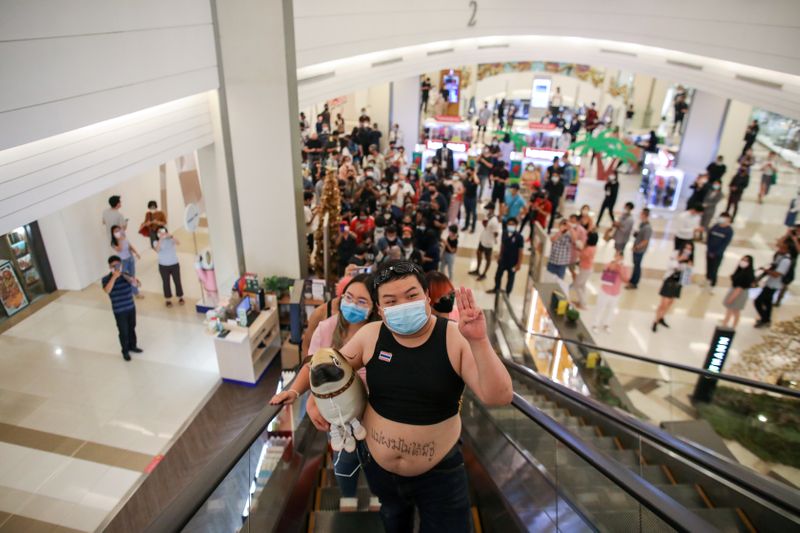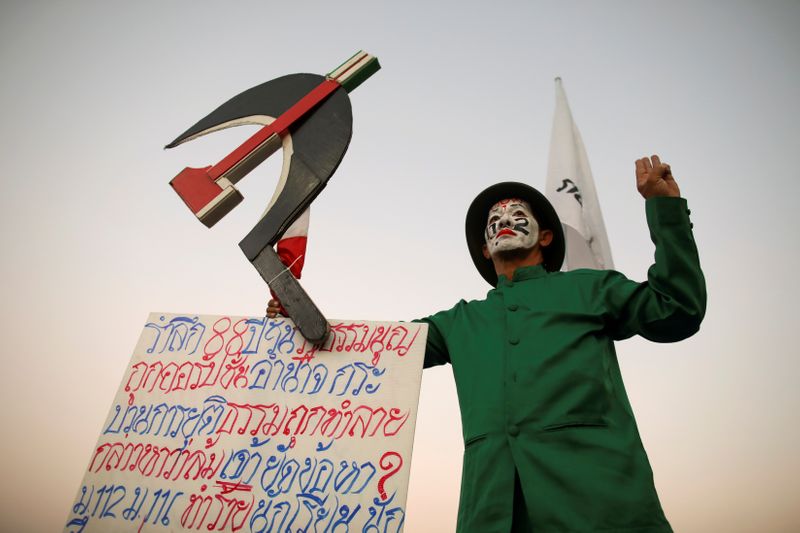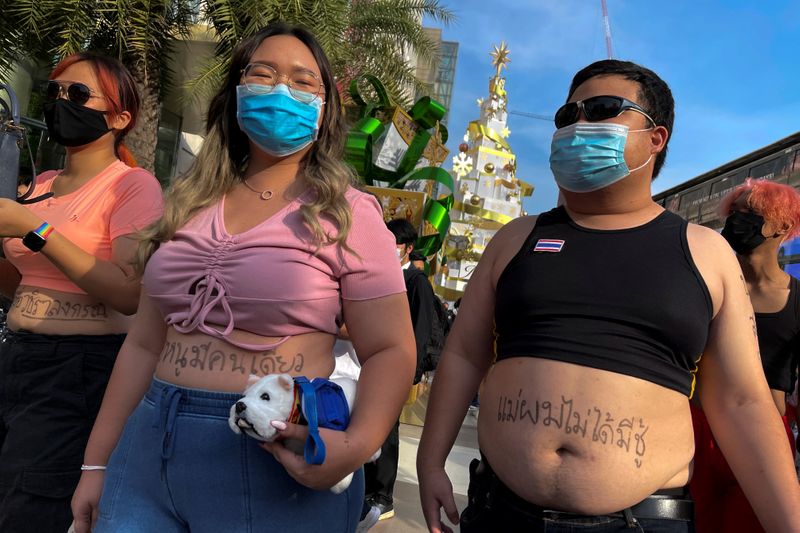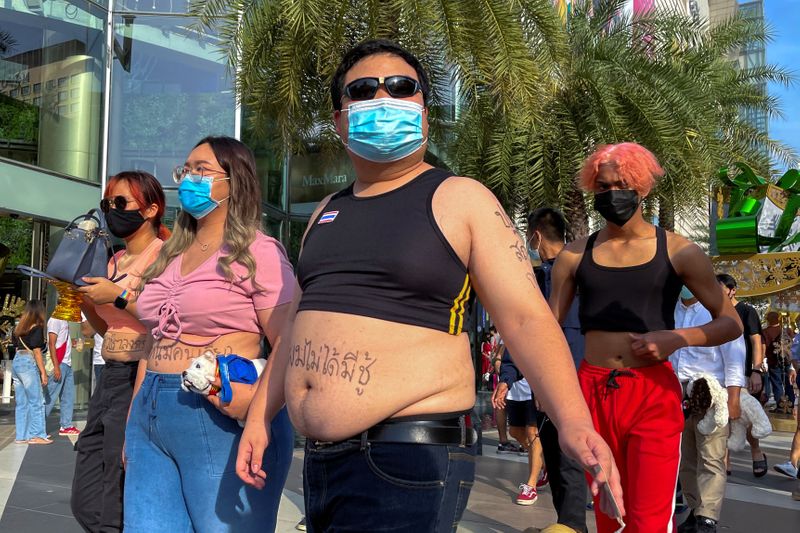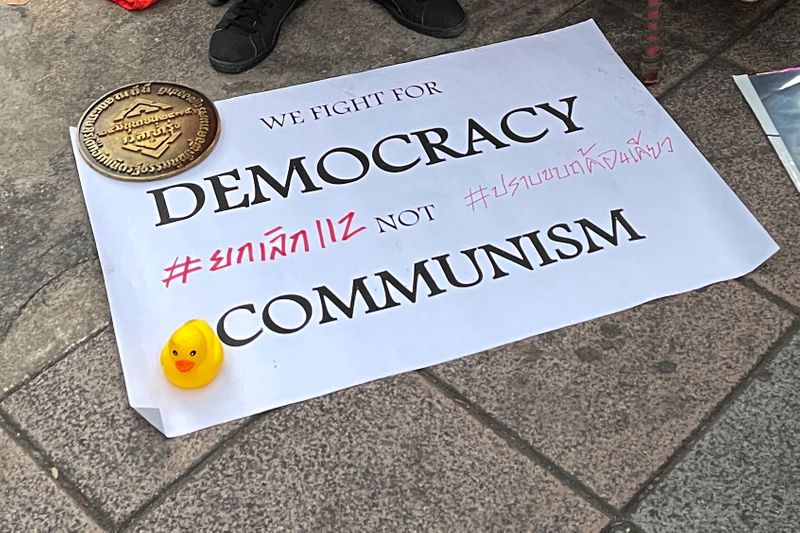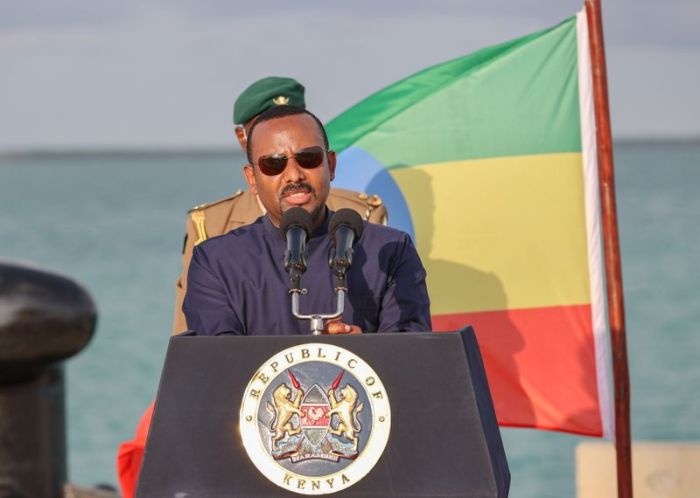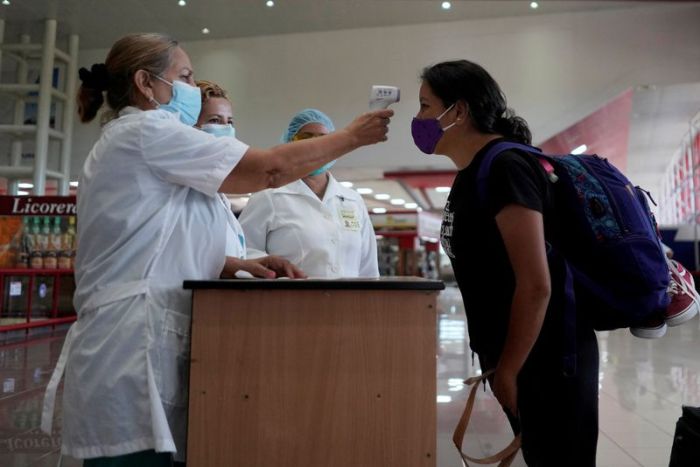BANGKOK (Reuters) – As they paraded through a Bangkok shopping mall in crop tops to mock Thailand’s king, protesters made an incongruous sight among the festive decorations.
They brought stares, smiles and some muted cheers, but the few dozen activists were far short of the tens of thousands who joined earlier anti-government protests that broke the taboo on criticising King Maha Vajiralongkorn.
After months of street demonstrations that have shaken Thailand’s establishment, the best-known figures of a movement that drew tactics and inspiration from protests in Hong Kong told Reuters they are at a critical juncture.
There are disagreements over strategy, fatigue, scores of charges brought in a royalist backlash and now a coronavirus outbreak that could make mass gatherings hard.
“I think most people are exhausted,” said Parit ‘Penguin’ Chiwarak, 22, who helped lead the crop top protest, noting that exams at the end of the university term made it hard for students to join.
“We’ll try again next year,” he told Reuters. “We won’t stop no matter what.”
Government spokeswoman Rachada Dhnadirek said authorities were not against protesters expressing their views, but a rise in coronavirus cases meant there should be no large gatherings for any reason at the moment.
The crop top protest, however, showed just how far discussion has shifted in Thailand, with its defiance of the royal insult law by openly lampooning a king who has been pictured wearing a crop top in European tabloids.
But divisions between protesters have become more evident as they discuss how best to maintain their push next year to unseat former junta leader and Prime Minister Prayuth Chan-ocha, to rewrite the constitution and to curb the king’s powers.
The main factions are student protesters linked to the Thammasat University, including Parit and Panusaya ‘Rung’ Sithijirawattanakul, and the Free Youth group, which kick-started the protests in July. Both have been allied, calling themselves the “People” movement.
But Parit and Panusaya, 22, have distanced themselves from the launch of Free Youth’s Restart Thailand movement, with a logo whose RT letters resemble a hammer and sickle.
Critics of Restart Thailand say it risks putting some people off with apparent communist symbolism in a Southeast Asian country where a two-decade long communist insurgency ended in the 1980s.
“A lot of people are confused,” said protester Kent Ruqsapram, who brought a sign to one event that said “We fight for democracy, not communism” to make his point.
DIFFERENT MEANS
Meanwhile, Free Youth’s Jutatip Sirikhan, 22, said the group will focus on its own campaign next year despite the earlier alliance with the student leaders.
“We want to create more participation from all groups, whether labourers, farmers or those without access to social welfare,” she told Reuters.
It is not the first time that divisions have surfaced and both groups say they have the same goals of breaking the decades-old hold on power of the army and palace.
“Both still go in the same direction, just use different means,” said Arnon Nampa, 36, a rights lawyer who said he aimed to step up the push for reforms to the monarchy next year as the campaign for change continues.
“The longer this goes on, the more people will understand the problems and side with us – like water eroding rocks,” he told Reuters.
There is little to show yet on the core demands.
Prayuth has dismissed calls to stand down, discussion on the constitution will only proceed on the government’s terms and the Royal Palace is ramping up a PR campaign rather than entertaining any possibility of change.
“The protests are weakening,” Warong Dechgitvigrom, 59, of royalist group Thai Pakdee told Reuters. “The government can just let the movement die on its own.”
The royalists are behind a surge of lese majeste charges against protest leaders – with a coordinated effort described by Warong to bring complaints to police on charges that can lead to up to 15 years in prison.
Anyone can bring such a royal insult complaint. Grounds have included everything from using the king’s own words disrespectfully to dressing in clothes that parody the royals.
At least 35 activists now face lese majeste charges – many of them multiple charges, according to data from Thai Lawyers for Human Rights: Parit alone faces eight. Total charges against all activists now number in the hundreds including those for sedition, computer crimes, illegal assembly and flouting coronavirus restrictions.
“It can drain a lot of time, resources, and energy,” said Free Youth’s Tattep ‘Ford’ Ruangprapaikitseree, 23, who faces six charges, including lese majeste and sedition. “It would be a lie if I said I didn’t lose heart sometimes.”
Like other prominent protesters, he is not currently detained, but is under police investigation to see if there is enough evidence for trial.
PROTESTS IN PANDEMIC
Thailand currently faces a new outbreak of coronavirus, with hundreds of cases reported among migrant seafood workers – a discouragement to mass gatherings if not the full lockdown the country went through early in 2020.
“We fought during the pandemic and did it without spreading the virus,” said Parit. “We can do more online.”
As in Hong Kong, online mobilisation has been a hallmark of Thailand’s youth-driven demonstrations.
Demonstrating enough support to force change in the real world, however, is a bigger challenge. Provincial elections on Dec. 20 largely returned establishment politicians despite being contested for the first time by a movement with youth support.
And the Royal Palace’s fightback is growing.
King Vajiralongkorn, 68, has begun an intensive public relations counter-offensive with Queen Suthida, 42, as a driving force in the campaign at visits around Thailand.
Also joining lavish public events have been the king’s daughters and his 35-year-old royal consort, Sineenat Wongvajirapakdi.
Sometimes spoken to the crowds, sometimes signed on royal pictures, the mantra is one of national unity under the monarchy – whose power and prestige were strengthened during the seven-decade reign of the monarch’s late father King Bhumibol Adulyadej.
“The monarchy and the people are inseparable,” the king told crowds at one recent stop.
And while the numbers have rarely been as big as the tens of thousands who have joined the protests, the appearances play every night on the royal television news that remains popular with older Thais.
“This has won them many hearts and minds,” said Termsak Chalermpalanupap, a visiting fellow with Singapore’s ISEAS–Yusof Ishak Institute.
Having been absent in Europe for most of 2020, the king’s return to Thailand in October marked the start of an intense round of appearances. A Reuters tally showed over 40 events, including more than a dozen at which the king spoke individually to members of the public – previously unheard of.
For protesters that is also a sign that they are having an impact and need to keep going even if it takes years.
“You think the government hasn’t responded, but it has,” said Arnon, the rights lawyer. “The king making unusual trips is a response. The government using the law to suppress or silence expressions is a response.”
“Fire has caught. It will keep burning,” he said.
(Additional reporting by Panarat Thepgumpanat; Writing by Matthew Tostevin; Editing by Raju Gopalakrishnan)

